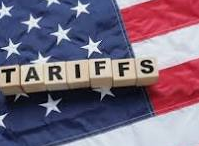By Cyril Mawuli ASARE
The recent United States tariff is the most topical issue at the global business front. The initial imposition of tariff by the United States and retaliation by China sparked a cycle that many analysts believe could lead ultimately lead to recession as a result of the initial inflation caused by the tariffs. The bank of England predicted a slump in global economic growth.
Ghana was not sparred of the tariffs, even traditional US allies like South Korea and the UK were not spared either, facing 10% and 25 % respectively. Ghana faces 10% tariff, not even the safe haven of AGOA could insulate our traditional export from the tariff increase.
Then comes the question, how do Ghana as a country react, there is an age old adage that, when the drummers change their beats, the dancers should change their steps, how does Ghana change its steps in relation to the change in beat by America. China chose to retaliate, South Korea chose to negotiate.
The Minister for Foreign Affairs, Samuel Okudzeto Ablakwa initiated conversations with the American Ambassador to Ghana, Ms Virginia Palmer, on the tariff issue, although this is commendable on the part of the minister, the press release after the meeting did not address the key issue at hand, a meeting at a higher diplomatic level at the White House will be required to ameliorate the tariff to ensure our exports continue to remain competitive.
That’s what South Korea is doing, Cheong In-Kyo, Trade Minister for South Korea was in the White to negotiate lower tariff on their exports to the US Market.
What are the odds for Ghana, the value and volume of our exports to the US market is small compared to global giants like South Korea, China, the EU and Canada, this does not place us in a competitive position during negotiations in the global free market economy.
Also, judging from precedent, the Trump Administration uses tariff as a double edge sword to fulfill other objectives; a 25% tariff on Canadian exports into the USA market compelled Canada to invest heavily in border security to curtail the flow of illicit drugs into America through the northern border.
Outside the tariff issue, Ukraine was to pay for American armament with its natural resources. Analyst believe President Trump will demand South Korea pays more for American forces in South Korea to get more concessionary access to the US market.
President Trump is not the usual politician who is concerned about public image, environmental factors, global peace but a business man who prioritizes the economic well-being of American above everything. Based on the above, what are chances of success for Ghana at the white house.
On the other hand, the President, HE John Dramani Mahama has directed the Minister for Trade, Industry and Agri Business to deal with the USA tariff issue, simply put, find a way round it. The key issue is Ghanaian exports should be price competitive to trade favorably with other competitors.
There are two main factors that influence the price competitiveness of Ghanaian exports, exogenous and endogenous factors. Tariff is exogenous and not within the control of the Ghanaian government. There are endogenous factors like power and other factors of production that can be realigned to mitigate the effect on the 10% tariff.
The operational inefficiencies in the power sector if corrected should result in a more competitive price to the final consumer, also can we as country decide to subsidize power for our manufacturing industries and charge premium price to high net domestic consumers? Low cost of power is key to industrialization and a major contributor to the industrial boom of China.
Can the tax regime be realigned to tax the extractive industries more and offer tax holidays to export oriented companies? How much does the Ghanaian business man pay for capital compared to his counterparts abroad, can there be a programme where banks are encouraged to offer concessionary credit to firms in particular sector of national interest.
Negotiating tariff with the USA, although possible might come at the expense of a national heirloom, what are the chances corporate Ghana will even take advantage of any concessionary trade agreement.
Realistically, how much advantage did we take of AGOA for over two decades of its existence? As president Mahama directed, this is the time to work and create a very conducive environment for businesses to be competitive on the global scale.
When the Ghanaian businesses are given regular and competitively priced power and capital, they can conquer the world, efforts towards attaining this in my humble view are likely to yield more success than renegotiating 10% tariff.
As the adage goes, when drummers change their beat, dancers should change their steps, we need to change our steps by doing what will make us more competitive on the global stage, not asking the drummer to change his beat.










